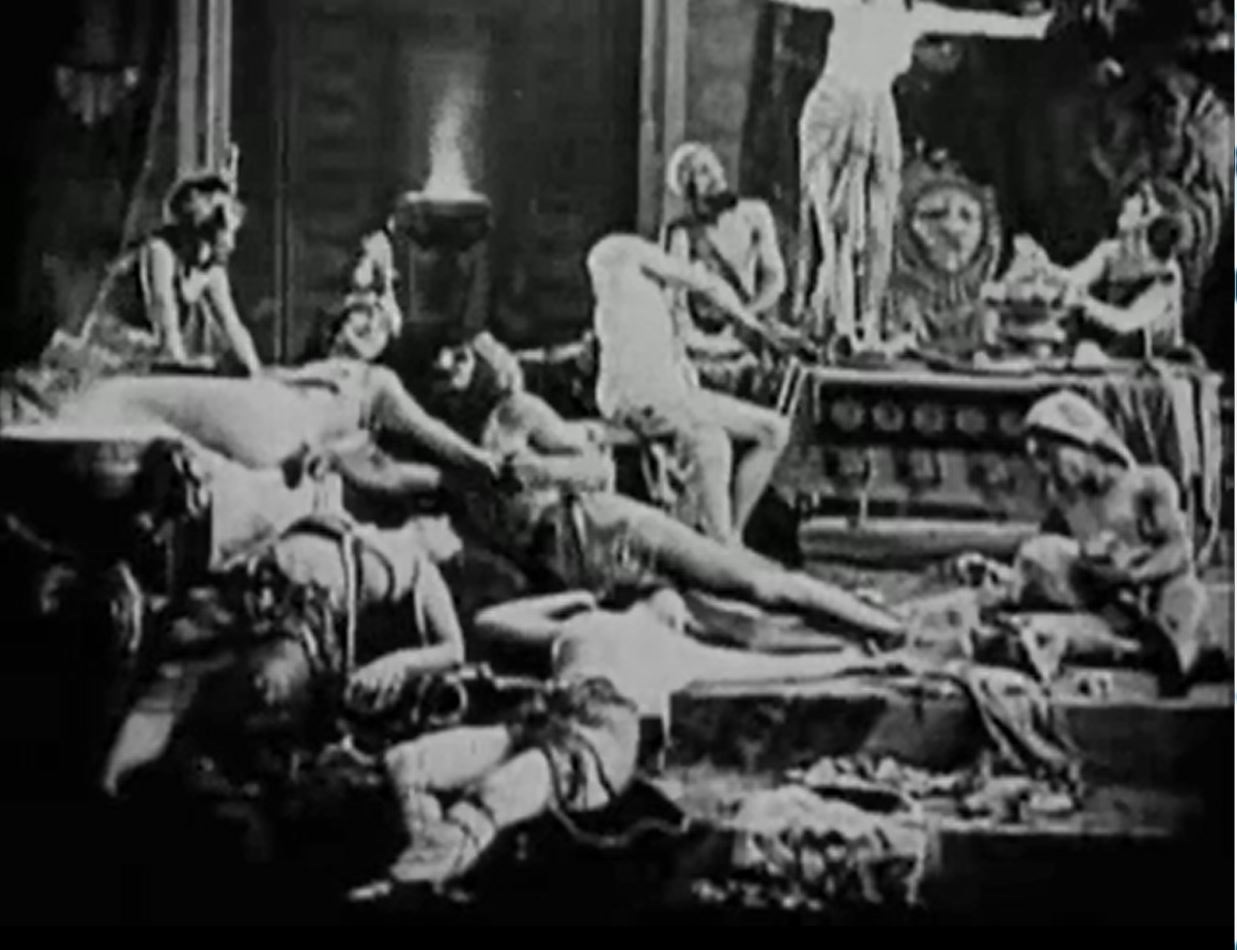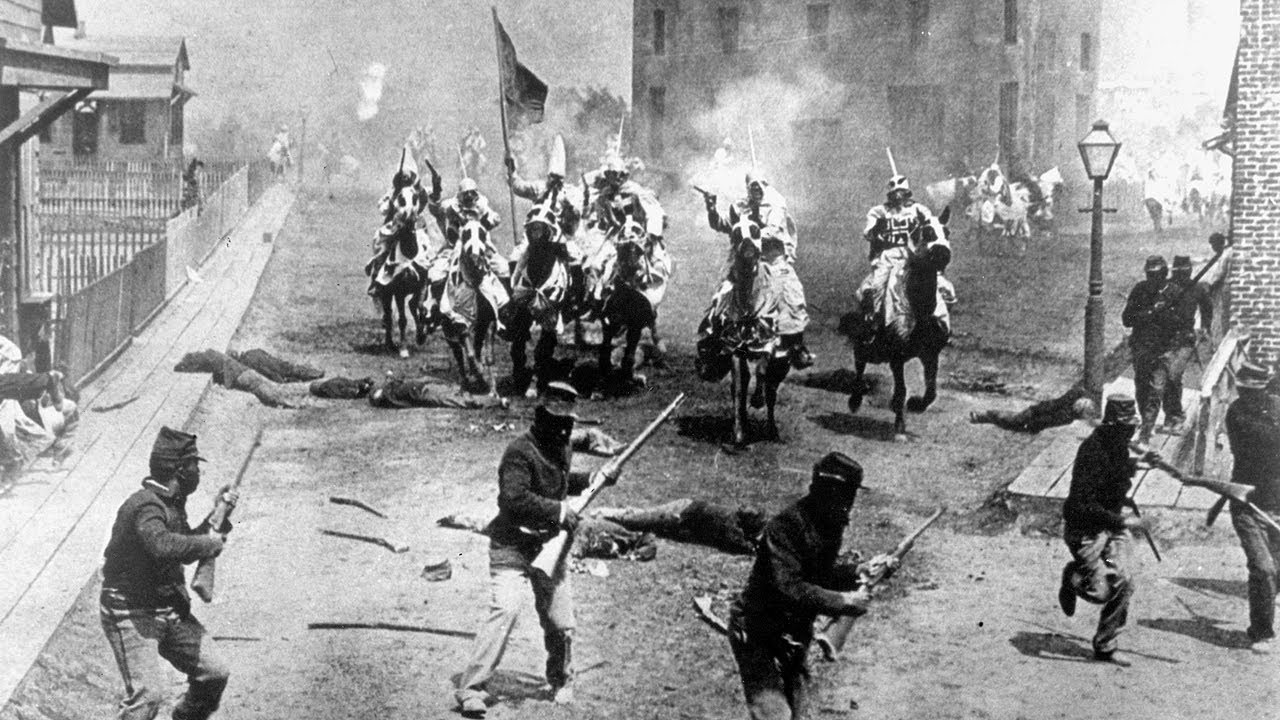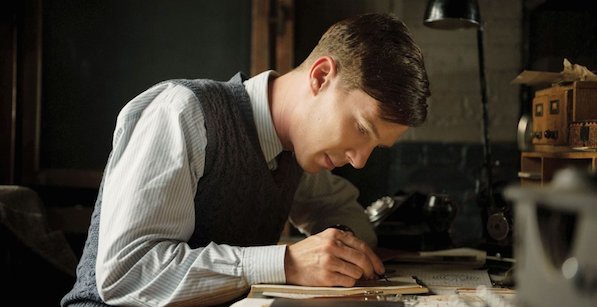
Films designed to dramatize actual historical events are as old as the cinema itself. André Calmettes’ L’Assassinat du duc de Guise (1908) so thrilled audiences with its recreation of a single incident that it spurred a host of others to do likewise.
Most notable of those was D.W. Griffith, who, eight years later, made Intolerance (1916); a film that daringly juggled several historical dramas including the Life of Christ, the Fall of Babylon, the St. Bartholomew’s Day Massacre (rendered even more strikingly by Parice Chereau in his 1994 Queen Margot) and a modern title dealing with labor troubles of the time, later released separately by Griffith as The Mother and the Law. But it’s his Babylon we remember when thinking of Intolerance.
Did ancient Babylon really look like that? No one was around from that era to criticize Griffith as they had so eagerly of his previous super-production, The Birth of a Nation (1915), which hailed the murderous racism of the Ku Klux Klan as a salutary event in American history.
It was a notion no Black American could possibly accept—though many whites (to this very day) do.
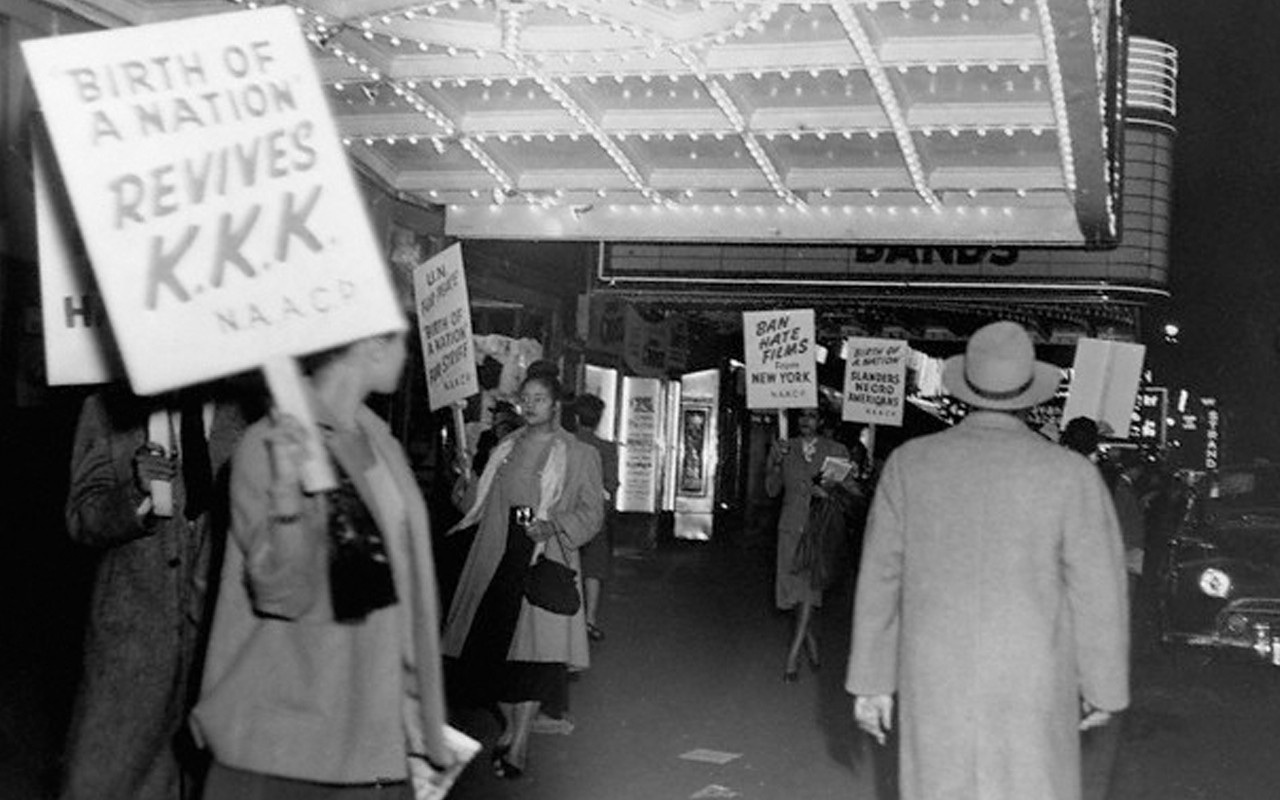
In Griffith’s time there were still a good number of people around with memories of the American Civil War to correct Griffith’s record. Other historical events and personages, however, profit from the passage of time such as all films in which England’s Queen Elizabeth the First is the central character. Actresses as different as Flora Robson, Bette Davis, Glenda Jackson and Cate Blanchett have played the fabled monarch to great acclaim. Not because any of them had access to the “Absolute Truth” but because each in her own way created a compelling image of a powerful monarch. So when it comes to history, Truthiness, that aura of “authenticity” satirist Stephen Colbert coined to describe something far more useful than the actual “truth,” is the rule. Robson, Davis, Jackson and Blanchett seem “Elizabethan” to us today—and that’s all that matters. But when the distance between history and cinema is shorter, caveats appear like ants at a picnic. And that’s what’s happened in 2014 with such noteworthy yet controversial works as Selma, American Sniper, Foxcatcher and The Imitation Game. These films about Martin Luther King, Chris Kyle, John DuPont and Alan Turing have been both lauded and criticized. And in the case of some, Truthiness has invariably come to the rescue.
Recreating the famous Selma-to-Montgomery Alabama march for voting rights in 1965, director Ava DuVernay and screenwriter Paul Webb have been praised for their spirited recreation of this turning point in the history of the black civil rights movement. But they have also been faulted for their portrayal of President Lyndon Johnson and his relationship with Dr. King. In a column written for Politico, Mark K. Uptegrove declares the film’s LBJ “is devoid of any palpable conviction on voting rights. Vainglorious and power hungry, he unleashes his zealous pit bull, FBI chief J. Edgar Hoover. . . This characterization of the 36th president flies in the face of history. In truth, the partnership between LBJ and MLK on civil rights is one of the most productive and consequential in American history.” But as Julian Zelizer (The Fierce Urgency of Now: Lyndon Johnson, Congress, and the Battle for the Great Society) points out in a recent interview, this is par for the course as Johnson “was a Southerner, so just to begin with you have to understand that many liberals in this period didn’t trust the South. They thought the Southerners, basically as a whole, were against almost every piece of civil rights legislation and they also believed they were against unions. . . The irony is that when I looked at Johnson for this book and did the biographical part of it it was clear that he was extremely liberal—in some ways more liberal than John F. Kennedy.” To Zelizer, Selma’s Johnson is “indifferent—and even hostile—to civil rights. He is not enthused at all about the program and a lot of the story line is about his relationship with the FBI and J. Edgar Hoover, investigating Martin Luther King rather than trying to work with him. That’s just not true.” But the Truthiness of a Johnson in cahoots with Hoover is far easier to make a Hollywood movie about than the man who passed the Civil Rights Act.
A sticky-wicket of a different sort has emerged in the wake of the release of Foxcatcher, director Bennett Miller’s film about psychotic millionaire John DuPont (played by noted comic actor Steve Carell) and the horror he wrecked on brothers Mark (Channing Tatum) and Dave (Mark Ruffalo) Schultz, both champion wrestlers he was promoting for his own Olympic team.
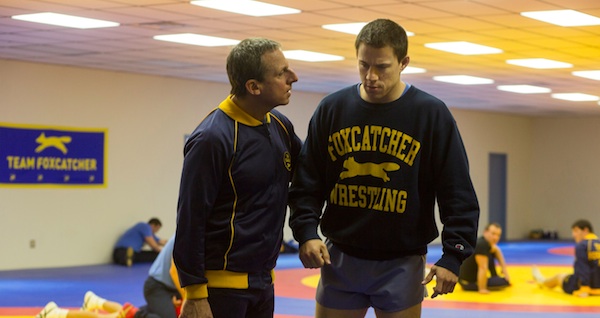
The film climaxes in grotesque tragedy when DuPont shoots Dave for “interfering” with his plans. His plans clearly revolve around the fact that DuPont (who died in prison) is sexually attracted to Mark Schultz—a matter Miller dramatizes with considerable discretion and restraint. But while fully cooperative with the film’s making—when the reviews came out, all of which noting DuPont’s obvious desire for Mark Schultz,the real Schultz went ballistic. “I told Bennett Miller to cut that scene out and he said it was to give the audience the feeling that duPont was encroaching on your privacy and personal space. I wasn’t explicit so I didn’t have a problem with it. Then after reading 3 or 4 reviews interpreting it sexually, and jeopardizing my legacy, they need to have a press conference to clear the air, or I will.” But Truthiness will out (to mix a metaphor) and there’s no way Schultz can “clear the air” to pretend DuPont’s sexual attracted to him wasn’t the source of trouble.

Mark Schultz is on his own with his objections. The same can’t be said of the late Chris Kyle, a Navy SEAL whose life and exploits in Iraq are celebrated in Clint Eastwood’s American Sniper, (played by Bradley Cooper) but derided in a Guardian article entitled “The Real American Sniper Was A Hate-Filled Killer” pointing out that the man Eastwood celebrates plainly and simply loved to hunt and kill people.

“Chris Kyle boasted of looting the apartments of Iraqi families in Fallujah,” wrote author and former Daily Beast writer Max Blumenthal. “Kill every male you see,” Rania Khalek quoted, calling Kyle an “American psycho.” As one can well imagine the reaction to such naysaying was far from salutary. “Retaliation from the rightwing twittersphere was swift and violent, as Khalek documented in an exhaustive (and exhausting) post at Alternet. “Move your America hating ass to Iraq, let ISIS rape you then cut your cunt head off, fucking media whore muslim,” wrote a rather unassuming-looking mom named Donna. “Rania, maybe we to take you ass over there and give it to ISIS … Dumb bitch,” offered a bearded man named Ronald.” As Auntie Mame would say “How vivid.”

But the biggest controversy of the season has revolved around The Imitation Game director Morten Tyldum and screenwriter Graham Moore’s film about mathematical genius Alan Turing and the key role played in Great Britain’s project to decode the Nazi’s “Enigma” code machine and thereby shorten–and win World War II. As is known today, but certainly not when the events the film takes took place as they were all highly Top Secret and therefore not subject to discussion. Likewise Turing’s sad end as after the war he was arrested and prosecuted for being gay and given the choice of either prison term or chemical castration–which would supposedly “cure” him of his forbidden desires. He chose the latter and, not long after the “treatment’ ceased, committed suicide. All of that the film makes dramatically clear. But not according to writer Christian Caryl in a New York Review of Books rant entitled “A Poor Imitation of Alan Turning.”

To Caryl the problem starts with Benedict Cumberbatch’s widely praised performance as Turing as he “conforms to the familiar stereotype of the otherworldly nerd.” One might well counter that Cumberbatch’s Turing in no way resembles Jim Parsons’ Sheldon Cooper on The Big Bang Theory. Forceful and resolute in his belief in his abilities he’s likewise far apace from the sad, passive Turing Derek Jacobi played in Hugh Whitmore’s Breaking the Code.
https://www.youtube.com/watch?v=S23yie-779k
But Caryl doesn’t take issue with that rendition. “There’s no question that the real-life Turing was decidedly eccentric, and that he didn’t suffer fools gladly. As his biographers vividly relate, though, he could also be a wonderfully engaging character when he felt like it, notably popular with children and thoroughly charming to anyone for whom he developed a fondness.” How very Will & Grace. Caryl goes on to claim “In reality, Turing was an entirely willing participant in a collective enterprise that featured a host of other outstanding intellects who happily coexisted to extraordinary effect.” But why should showing Turing at odds with colleagues, tough ultimately in cooperation with them, provoke anger?
“What this account neglects to mention is that Turing’s “bombes”—electromechanical calculating devices designed to reconstruct the settings of the Enigma—were already helping to decipher German army and air force codes from early on.” And what David Lean and Robert Bolt’s Lawrence of Arabia fails to mention is that Peter O’Toole was three times the size of the real T.E. Lawrence. What O’Toole had that no shorter actor at that time–or I imagine any other–could provide was the Truthiness required to suggest a fey eccentric could lead armies of Arabs to glory. Likewise Cumberbatch. But Caryl won’t be deterred by such a defense from moving in for the kill, calling the film “A bit like one of those smartphones that bristles with unneeded features, the film does its best to ladle in extra doses of intrigue where none existed. Tyldum and Moore conjure up an entirely superfluous subplot involving John Cairncross, who was spying for the Soviet Union during his service at Bletchley Park. There’s no evidence that he ever crossed paths with Turing—Bletchley, contrary to the film, was much bigger than a single hut—but The Imitation Game includes him among Turing’s coworkers. When Turing discovers his true allegiance, Cairncross turns the tables on him, saying that he’ll reveal Turing’s homosexuality if his secret is divulged. Turing backs off, leaving the spy in place.”
This sub-plot is scarely out of place to anyone who recalls the “Cambridge Spies”–Burgess and McClean or seen Alan Bennett’s beyond brilliant An Englishman Abroad which boasts not only the Truthiness of Alan Bates’ performance as the suave gay spy but the actual truth of Coral Browne playing herself in this dramatization of their chance meeting in Moscow and the tailored suit she helped him purchase. A delightful movie that would dobtless annoy Caryl who shows his true hand at the last.
http://www.youtube.com/watch?v=dsdexDZgr-8
“The filmmakers see their hero above all as a martyr of a homophobic Establishment, and they are determined to lay emphasis on his victimhood.” And why not? “Turing was convicted on homosexuality charges in 1952, and chose the “therapy” involving female hormones—aimed, in the twisted thinking of the times, at suppressing his “unnatural” desires—as an alternative to jail time. It was barbarous treatment, and Turing complained that the pills gave him breasts. But the whole miserable episode ended in 1953—a full year before his death, something not made clear to the filmgoer.” See? Turing had a whole year to “get over it.” This is evidently something Caryl imagines easily done. One can only but refer him to Victim, Basil Dearden’s attack on British anti-gay laws.
-large-picture.jpg)
Made in 1961 it starred a very famous and at the time quite understandably closeted actor named Dirk Bogarde. The film altered his career, moving him from mere “matinee idol” to deeply serious actor in some of the best films ever made by Joseph Losey, Luchino Visconti and Rainer Werner Fassbinder. While taking this “risk” and in the years afterwards, right up until his death Bogarde declined to “Come Out.” And in light of Caryl’s condescending attitude towards Alan Turing that’s no surprise. “It’s likely we’ll never know the whole story,” Caryl claims. But the story The Imitation Game tells is more than sufficient, especially for those of us with a knowledge of LGBT history that Caryl clearly lacks. Victim helped immeasurably in striking down the anti-gay laws that condemned Alan Turing to virtual, and then literal, death. It’s well worth lauding. And so is The Imitation Game.

